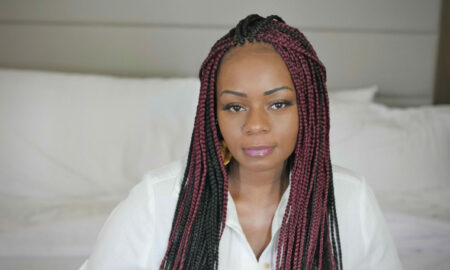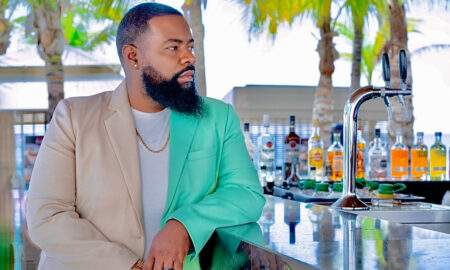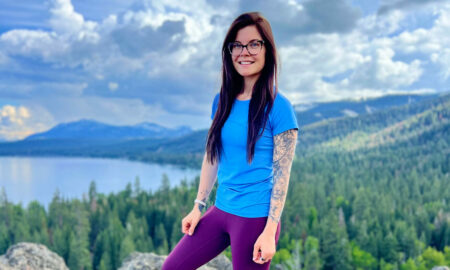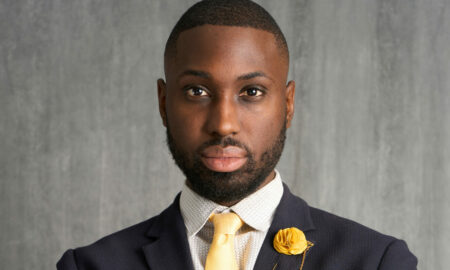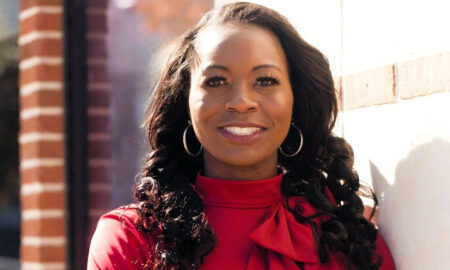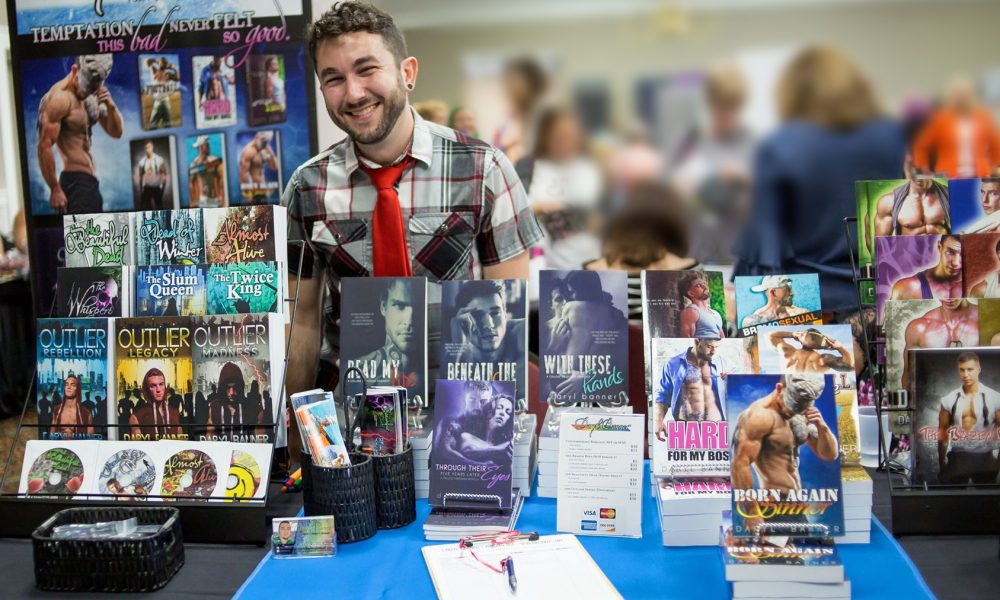

Image Credit: Taylor Alexander Photography
Today we’d like to introduce you to Daryl Banner.
Daryl, please share your story with us. How did you get to where you are today?
My journey so far began as a theatrical teenager who acted in every play at Katy High School from 1998 to 2002. While in high school, I wrote a play that was chosen by the Alley Theatre HYPE program for a production, which more or less set me on a path of writing more seriously. (Also, I was the first senior at Katy High School to write and direct his own senior-directed one act play, which was pretty crazy in and of itself!) I went on to major in Theatre and Psychology at the University of Houston. (Go Coogs!)
While at the University of Houston, I was lucky enough to have an original play of mine selected for the Edward Albee Playwrighting Workshop, which selects four to five plays each year (from hundreds submitted worldwide) to produce. Due to personal reasons at the time, Pulitzer Prizewinning playwright Lanford Wilson stepped into mentor the program in Edward Albee’s place. I was shocked to have had my work selected the first year, but then doubly shocked to find my work selected for a second year in a row.
Lanford was a pretty amazing and one-of-a-kind guy. I genuinely feel lucky to have known him. His tutelage (read: his being super strict over my word choices and constantly pushing me to be a better and better storyteller) got me through the writing and completion of my very first novel. I owe so much to him for the skills he taught me that I still employ today in my writing. Literally, I hear his voice in my head sometimes when I write, saying, “No, don’t use that word!” and “Ugh, say that more creatively!” and finally “Yes, better.”
Music is another passion of mine since I was a little annoying kid playing too loudly on pianos and (unknowingly) teaching myself music theory over my childhood and teenhood. After the production of my second play with Lanford, in 2005, I submitted original poetry, lyrics, and a short story to be considered for Tony-Award-winning musical producer Stuart Ostrow’s Musical Collaboration class. To my utter shock, I was selected to be a writer for their 2006 productions. After Stuart heard that I also write music, he auditioned me, and after literally 1 minute of me at the piano improvising a piece of music from thin air (seriously, I was so nervous, I had back sweat), he named me the composer of my own work, too. No pressure or anything! So after all was said and done, I ended up writing the script, lyrics, AND music for a musical produced as part of the class in 2006 alongside two other musicals written by other students. During that time, I learned a crazy amount about story structure, my own voice, and creative practices that I still use today.
After college, I continued finishing up my first novel, while corresponding with Lanford Wilson, whose health was declining. When my book was completed, Lanford pushed me to submit query letters out to literary agents and publishing companies, hopeful that I would have at least one bite or interested party. I sent out over 90 query letters. They were met with over 90 rejections.
So I decided to suck it up and pursue publishing my work independently via Amazon. I did so in 2010, publishing my very first novel titled “Psychology Of Want” about a troubled sex addict in college. It blew up, and I became an overnight success, and all of my dreams were realized at once. (Insert: uproarious applause!)
Just kidding. I made little to nothing. Determined (and also terrified), I printed copies of my own books, brought them to various local bookstores, and more or less peddled them to anyone in sight. It was hard work, and it was humbling work. I gave away a lot of copies to friends. No one took my endeavors seriously except for Lanford, and my ever-encouraging and loving mother, who came with me to those bookstores and, just as enthusiastically, peddled my books too. I had no confidence or backbone in what I was doing. I didn’t know what I was doing at all. Every lesson I’d learned in college flew out the window, and I felt lost and alone.
Over the next year, I – somewhat begrudgingly and with a “shrug, what do I have to lose?” attitude – worked on writing my second novel. It was a story that was heavily (and perhaps comically) influenced by my working a day job at a local Cinemark movie theater in Katy as a senior manager. All my stresses went straight to the page – with creative liberties taken, of course – and it became something like therapy for me.
It wasn’t until 2012 that I finally published that second novel, which I titled “super psycho future killers” (all in deliberate lowercase). It centered around a disgruntled, self-deprecating movie theater manager who, to his surprise, discovers one day that he can time travel. In many ways, my second novel felt like a literal cry for help, wanting freedom to pursue my dreams, and feeling trapped by the ticking clock. Still, my writing work saw little success, and only in very niche reading circles.
At this point, I didn’t see this “writing books in my spare time” thing as something that might one day support me. I could barely call it a hobby, with as little time and energy as I had in my days to devote to it. I felt in despair and hopeless. I happened to be a big fan of Chuck Palahniuk’s work at the time (the author of Fight Club) and decided to write him a letter expressing my frustrations with balancing a day job and a creative dream.
After writing the letter, I realized there was nowhere to send it, as all of his professional pages were manned by people who – more or less – restricted any communication with the author himself. I discarded my letter, feeling even more dejected. My mom however, unbeknownst to me, found my letter, did some research, and mailed it to Chuck’s literary agent without my knowing. She didn’t say anything to me, certain it wouldn’t be received anyway, let alone responded to at all.
Then one day, I receive a box in the mail… from Chuck Palahniuk himself. It was a box full of trinkets, knickknacks, tiny toys, and a whole lot of glitter. Among the items, Chuck wrote me a letter of encouragement, of a lot of “real talk” about the industry and the craft of storytelling itself, and included a necklace he made me with his own hands. I was astonished, literally and emotionally lifted off my feet, and felt my spirit completely rejuvenated. I have a shelf devoted to that letter and Chuck that I take a glance at now and then to remember one of my lowest (and highest) points.
In 2013, a lot of things happened, and very quickly. My grandfather passed away. A good friend of mine from high school died tragically. And a person with whom I had performed in a college play passed away. Meanwhile, I kept hearing Lanford’s voice in my head as I tried to write, except now, even he was no longer with us.
There was so much death around me that I wanted to turn it all into something ‘beautiful’ and inspiring, and so I began writing my third novel – which would be a total departure from my first two. The novel was an imaginative, post-apocalyptic fantasy adventure that starred a female Undead 19-year-old in a society of other peacefully living Undead – with a dark, curious secret. I called the novel “The Beautiful Dead,” and I dedicated it to Lanford Wilson, as well as everyone in my life I’d recently lost.
At first, the book was met with quiet appreciation, particularly among lovers of young adult fiction, Harry Potter, and Twilight. Then, on a total whim, my mother and I went to a book signing convention where I brought a few paperback copies of my new book. I gave one to a very well-known and established author in the independent publishing world named Madeline Sheehan. I thought she might simply smile, perhaps stick the book on a shelf when she got home, and nothing would happen.
Instead, I got a message and a friend request on Facebook a few days later from Madeline herself, where she explained that on the plane ride home to New York, she devoured my entire novel from beginning to end. To her, it immediately went to the top of her “best of” list. She loved the novel so much, she immediately began posting about it on Facebook and urging her readers to check out the book – and this totally “new and upcoming” author named Daryl Banner.
I continued my pursuit of imaginative sci-fi/fantasy writing and compiled notes I’d made over the past ten years of an “epic series” I’d someday write that inspired me. I finally got the courage to write the first book in the series, titled “OUTLIER: Rebellion.” I published it in 2014. Very soon after, I became involved with two talented local Houston singers (Julia Laskowski and Patti Rabaza) who had an opening for a pianist in their original musical titled “Country Gravy and Other Obsessions,” which they planned to take on tour. It would be paid, it would support me, and it would take me all over the country.
After much deliberation, I decided at long last to leave my comfy day job at the Cinemark movie theater and pursue a life on the road as a performer. It was a huge leap of faith. I was terrified, yet excited. I had dreams in my eyes of performing on stages across the country, all while writing my fantasy novels in my spare time. The two women were lovely and supporting, and I was even able to write and contribute two original songs of my own for the show, which I both played and performed. We toured Arizona, Louisiana, Texas, North Carolina, and even an off-Broadway theater in New York City.
Meanwhile, I finally finished and published my follow-up to the Beautiful Dead, titled “Dead Of Winter,” my fifth novel. While my books still made next to nothing in terms of income, I was over the moon with living a life on the road and making use of that lovely Theatre degree I’d gone to college for. After a few months, however, the tour came to a sudden end, and the means were not there to continue pursuit of the musical. The wonderful women who brought me along for the tour returned to their voice lesson jobs and singing gigs. But I didn’t have anything to fall back on, since my books were not selling enough to support me. And after having a brief taste of freedom that life on the road gave me, I refused to return to the movie theater.
Somewhere on the road, I had something of a creative epiphany. It was a moment I had in a bar with the two women from the musical – it was one night after a performance – and I saw a very attractive man at the end of the bar. My heart swelled up. It was practically love at first sight, if it weren’t for all the smoke in the air and my stinging eyes. And then he left before I got the nerve to say hi, and I went back to my hotel that night feeling empty and lonesome and regretful, kicking myself for being such a coward.
That’s when I had my epiphany. Romance was something I used to scoff at, but then I realized that everything – life itself – is romance. Every day is a romance, especially when you’re single and always “looking” everywhere you go. In real life, I might’ve missed my chance to approach that beautiful man in the bar and say “hi.” But in a romance novel – I get to go right up to that man and say “hi,” and a whole story can unfold.
Soon after the tour ended, I reconnected with my author friends and decided – despite my misgivings and doubts – to try my hand at the romance genre. While all of my friends wrote straight romance, I figured I would “write what I know” and tell a gay love story in my own way, using my unique Theatre-trained storytelling style and voice. It felt natural. It made me feel exposed, too. And it was – in many forms – my way of coming out to the independent author world. I released my sixth book and very first romance – “Dorm Game” – at the beginning of 2015.
That’s when my life changed forever. I made more in that one month of Dorm Game’s release than I had made in my previous five years of writing combined. For the rest of that year, the words simply flowed. I wrote eight more short gay romances (called male/male romances), releasing approximately one a month. I felt like I was writing my own life onto paper, and having fun with different “boy meets boy”-style love stories. And (quite literally) before I even realized it, I had become a self-supporting independent author.
During the writing of my gay romances, I also continued the writing of my other series, finishing and releasing OUTLIER: Legacy (Book 2) and OUTLIER: Reign of Madness (Book 3) as well as Almost Alive (The Beautiful Dead Book 3) and The Whispers (The Beautiful Dead Book 4). In the middle of 2016, I tried my hand at writing my first “straight” romance, setting it in a fictional Texas college, and centering it around a female New York theatre singer who comes down to small-town Texas for college and gets involved with a hunky (and brooding) lighting tech who turns out to be deaf. I called it “Read My Lips,” and it eventually turned into a 3-book college series with each book centering around a different couple among a group of close-knit friends. That invited a whole wave of awesome new readers to my work, several of whom I’ve gotten to know well, and many who have never read a gay romance before. I was their first, and it was an absolute honor (and kind of mind-blowing, if I’m being completely honest!)
As 2017 and 2018 came around, I started writing full-length gay romances with guaranteed happy endings, releasing titles like “Football Sundae” about a young budding dessert chef and a college football star, and “Born Again Sinner,” about a heated relationship between a military vet and a minister’s son. I also tried my hand at romantic comedy with “Hard For My Boss” about a hilarious yet steamy relationship that builds between an intern and his demanding boss, as well as a friends-to-lovers second-chance romance called “Bromosexual”, which was my first novel to hit the overall top 100 list on Amazon, officially making me an Amazon Bestselling Author.
From 2015 until present day, I’ve been supporting myself solely on income from my books. In my free time, I compose music and engage in creative endeavors to keep my other skills alive. I’ve scored music for a variety of independent computer games and mobile apps, as well as two audio dramas / podcasts called “Here Be Dragons” and the more recent “Janus Descending”, both by New York City writer, actor, and producer Jordan Cobb, who features my original music and theme songs in every episode. I also compose accompanying soundtracks for my novels, such as “The Beautiful Dead” and “OUTLIER,” combining both my loves into one.
As of 2019, I have released over 30 titles on Amazon with several more on the way.
Overall, has it been relatively smooth? If not, what were some of the struggles along the way?
There was a time during my writing of romances around 2015 when the market shifted, and I needed to find supplemental ways to support myself. What started out at first as me helping out a fellow author whose editor had abandoned them only weeks before the release of their novel, turned into a relatively short two-year stint of becoming a part-time editor for a few fellow independently-published authors, including Jordan Marie, L. Wilder, Devon McCormack, as well as Sabrina Paige – an author who has reached the #1 spot on Amazon’s top 100 seven different times, including once with a novel I edited. Once my career as an author re-stabilized and I was on my feet again, I let go of my editing work and returned to being a full-time author.
There are also many struggles along the way of simply maintaining a career as a full-time author. For one, there is never a break between my books; I am always writing. Also, life is extremely different when you are your own boss and can’t count on your “days off” to relax. I literally have to assign myself time when I can just breathe and be a human. That might sound crazy, but it’s absolutely a daily struggle. For my first several years, “relaxing” was very difficult to do, since I never felt like I “earned” my time off, and I more often would work and write seven days a week, morning and night.
Also, I write in several genres. It’s a struggle at times to ensure that I am releasing enough romance in the year to pay the bills and satisfy my main core readers, but also give attention to my fantasy readers who are (less than patiently, haha) waiting for my next Beautiful Dead novel, or my dystopian readers who are eager for the next installment in my OUTLIER series. Also there are about a billion other projects I want to pursue but am forced to set aside due to time and energy.
Another big thing that affects my career: the mere fact that I write gay romance. Sometimes, it is very difficult to advertise gay romance on social media, and I have to get creative with finding new ways to target potential readers. I have had to defend my work from prejudice and hate speech online (which becomes, after a while, a bit more mundane and routine than you probably think. Just picture me in a garden plucking weeds. It isn’t some glorious crusade; it’s just tiring). I also attend several book signing events around the country as an author, and oftentimes must defend my work in-person to readers who find male/male romance to be offensive. With nine years of customer service at the movie theater under my belt, I find myself comically walking a tight rope at times of defending my work while also being pleasant, attentive, and positive. It isn’t always easy.
As far as my personal life goes, I’m met with judgment about my choice in career surprisingly often. When I tell someone what I do, I get confused looks and skepticism. I also get “but what do you do to support yourself?”. I also get “that sounds like a fun thing to do until you get a real job.” Yes, those words are used: “a real job”. Despite the judgment, I try to encourage discussion and transparency. I’d love to change the way some people think of independently published authors and, in the long run, help to give them a better name.
Another struggle I’ve had as an author, strangely, is simply the fact that I’m male. A large majority of authors in the independent book world are female, as well as the reader base. You might find it interesting to hear that the majority of male/male (gay) romance readers are, in fact, straight women. Quite often, I get told, “males don’t know how to write romance.” That’s another misconception I have to face.
We’d love to hear more about what you do.
I’m an independently-published author of romance, fantasy, and dystopian fiction. Independently-published means I’m not affiliated with any traditional publishing company. I do not have a literary agent.
I have to be my own marketing team, publicist, and publisher. I design my own covers and the interior of my paperbacks and digital content. I also code and maintain my website. I manage my advertising and run three Facebook groups and pages with readers of my work, with whom I regularly engage, as well as operate giveaways and news releases. I also manage a mailing list, which is its own whole stressful beast of maintaining and updating emails, and regulating newsletter giveaways and content.
It is a lot of work that a major publishing company is able to delegate to staff members, that I must do all on my own. It has taken many years and a lot of hilarious trial-and-error to figure out, honestly. I have to keep on my toes and never settle or become complacent; the market is constantly shifting, and I have to shift with it, learn, and adapt.
What is “success” or “successful” for you?
I think it’s more important to define happiness rather than success. I can write a bunch of bestsellers and make enough money to live on, but am I happy? Especially after the ups and downs of my career as an author so far, I can say I value creative fulfillment more than anything. It’s so easy to get caught up in the money, and value your success on how much you make, or how many people are reading your work, or how much attention your posts get on social media.
But at the end of the day, you have to be happy inside. Creating any kind of art takes that special balance of feeling absolutely thrilled and also absolutely unsatisfied, because art is about growing and trying and failing and struggling. When I think back on some of my “best books,” I don’t remember the money I made or the reaction of readers; I remember a dark, late night where I struggled to find the right words, and only after lots of grueling thought-work and changing my mind a hundred times, suddenly finding that one sentence that unlocks the rest of the story. It’s the journey that matters.
I remember emotions I summoned (you can picture that as dramatically as you like) on a lonely night to finish one of the final chapters of Almost Alive (the third book in my Beautiful Dead series), and how I will never forget that very specific, persistent, almost infectious feeling that sat in my chest – a feeling I created with my own words. It’s those tiny things that make me proud to be an artist – an author, a storyteller, a whatever you want to call it – and it’s those moments that I think are the closest to success I’ll ever dare to get.
On a different level, if I absolutely HAD to define success in some way, I think the closest thing to it for me is receiving personal messages from my readers about how my work affects them. It is truly an indescribable thing to hear from a reader that your work has somehow saved them, or gave them a perfect escape, or touched them beyond tears, or broke their heart (or mended it), or that your story is one they’ll remember forever.
Especially concerning my gay romance, I’ve received messages from men who felt lonely, and my work has created a world that makes them feel like they belong. Perhaps that’s an unusual trait in my gay romances: I tend to write them as if they take place in some parallel version of our world that is devoid of homophobia. I don’t like to include politics or gay-bashing or homophobia in my books, as if to set an example of the way the world ought to be.
Homophobia is absolutely a learned behavior – but so is compassion. And if my worlds can exercise compassion in a way that touches readers the way it has, then perhaps that, in its own little way, is success.
Pricing:
- My individual books range in price in digital format (Amazon Kindle) from $.99 to $2.99.
Contact Info:
- Website: www.darylbanner.com
- Email: daryl@darylbanner.com
- Instagram: www.instagram.com/darylbanner
- Facebook: www.facebook.com/darylbannerwriter
- Twitter: www.twitter.com/darylbanner
- Other: darylbanner.bandcamp.com





Getting in touch: VoyageHouston is built on recommendations from the community; it’s how we uncover hidden gems, so if you know someone who deserves recognition please let us know here.












